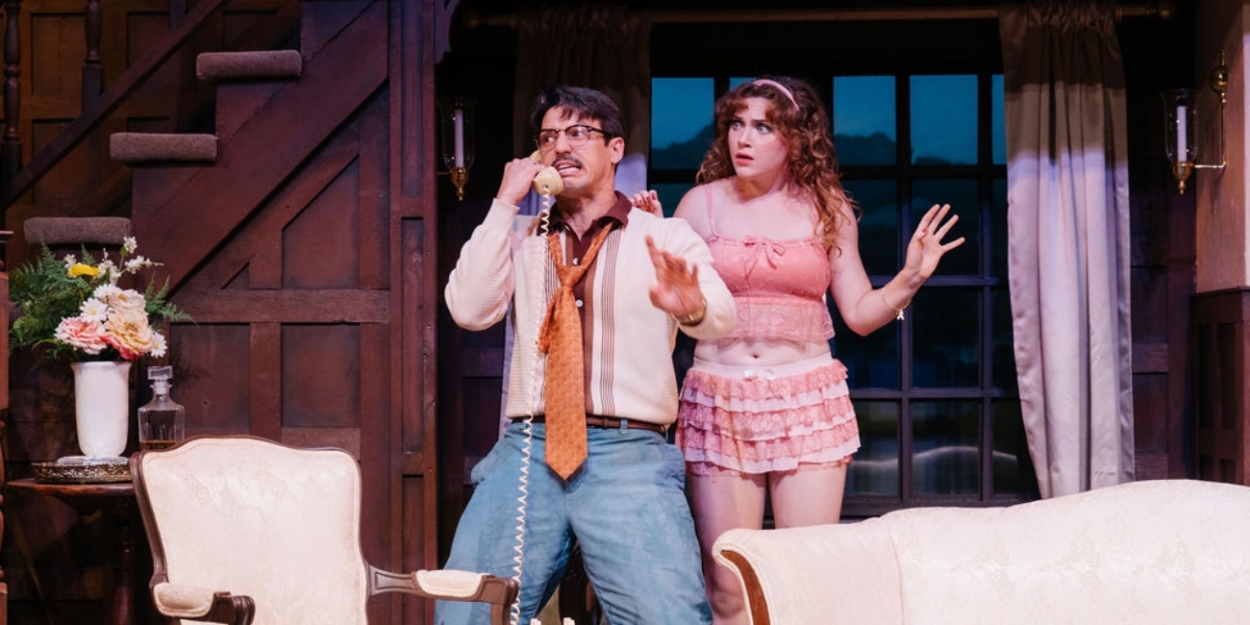Review: NOISES OFF at Keegan Theatre
Sardines and doors; don't you love farce?

Noises Off remains the hardest to perform play ever written, as well as one of the easiest and most fun to watch. The Play That Goes Wrong tried to surpass it, but it can't be done. Playwright Michael Frayn's 1982 play could be called a love letter to theatre people if it weren't the play that threatens to undermine their work because the play within the play that nestles inside it foils their ability to stay wrong. Want to laugh? Keegan's production runs through September 1.
In order not to break the Theatre Critics' Avoid-Spoilers Code, this article may get boring. But an evening at the Church Street Theatre, with its newly installed and very spiffy turntable, is anything but. See, there's this production of a play called Nothing On which almost isn't ready for its opening night. During Act I of Noises Off, the Nothing On company struggle to finish their final tech and dress rehearsal before the audience interrupts them by arriving at curtain time. If something can go wrong, well, you know the rest. The carefully timed "circumstances" start to snowball; tensions among the performers and the stage managers reach flood stage. Metaphors mix. Petty conflicts escalate during the next two acts; that is a ginormous understatement. And the gags (and the mishaps, and the slapstick comedy, and the audience laughing) never stop. Noises Off is the baby that Charlie Chaplin, Monty Python, The Not Ready for Prime Time Players, Buster Keaton, and Carol Burnett might have had; but they worked in short-form comedy. Noises Off is two and a half hours of farce. Send in the clowns, indeed.
All nine actors in Noises Off have mastered this insanely comically intricate script. Some favorite bits include Gary DuBreuil as Tim, the Stage Manager. Stage managers form the backbone of a show, but Tim (and his backbone) are overworked. Often using just body language and a couple of feet, DuBreuil's Tim anticipates every performer's need, director's want, and his own desperate longing for sleep. Brigid Wallace Harper plays Brooke aka Vicki, the ingenue of Nothing On, as if she's a beginning actor who can only say her lines and do no more if something goes wrong onstage (which it, of course, does). Harper, when her characters are not before the audience, spends her rehearsal or offstage down-time practicing every known physical warm-up exercise in the history of the acting profession. Her overdone earnestness is riveting fun to watch.
Providing a matrix for the visual fun is Matthew J. Keenan's glorious set design. Now with turntable, he has created the "living room of the Brents' country home" where Nothing On takes place as well as the 2 X 4 world behind the flats and doors (now with labels). And Cheyenne Hill's costume designs add comedy too: Harper's Brooke spends most of the show in her smalls (that's British for underwear), and Hill has made sure they are both dainty and the opposite of skimpy--the garment equivalent of an intimacy coordinator. Susan Marie Rhea's house slippers (worn with socks, thus resembling Burnett's charwoman) add to her hilarious take on Housekeeper, Dotty Otley, the star of Nothing On. Everybody ought to have a maid. Tony Angelini's sound design is also a crucial comic element of this production where offstage sounds (noises off, get it?) might as well be one of the characters. But words on a page or a website fail to express how much fun this show is for an audience. Mark A. Rhea, properly credited as both director and choreographer, has orchestrated, nay ringmastered, a thoroughly entertaining show in spite of how hard it remains.
(photo of Ryan Sellers & Brigid Wallace Harper by Cameron Whitman)
Reader Reviews

Videos

